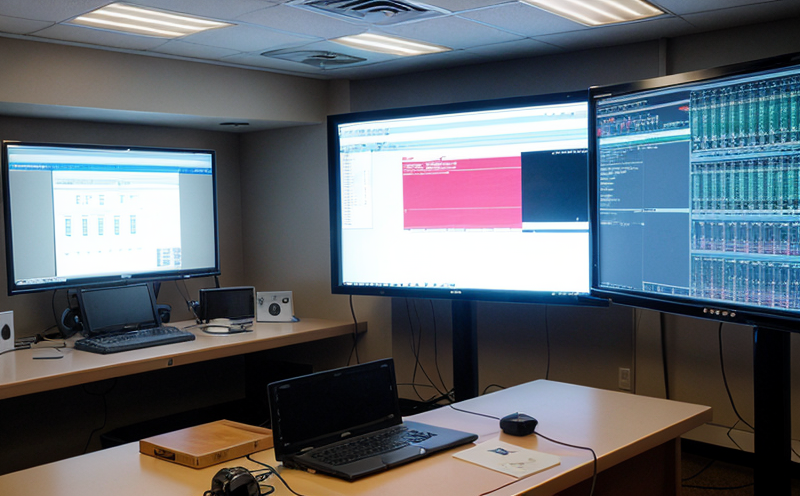EN 50126 Performance Testing of Interlocking Systems
The European standard EN 50126 is a cornerstone in railway and transportation testing, specifically targeting safety-related interlocking systems. These systems are critical for ensuring the safe operation of trains by preventing conflicts between different rail operations. The standard provides specifications for the performance evaluation of interlocking systems to ensure they meet stringent reliability and safety requirements.
Interlockings play a vital role in railway signaling and control, acting as the backbone for managing complex traffic flows and safeguarding passengers' lives. Compliance with EN 50126 is not only an obligation but also a testament to a manufacturer's commitment to delivering high-quality, safe products that comply with international standards.
The testing process under EN 50126 involves several stages, including:
- Initial evaluation of the system design and documentation
- Functional testing using simulated traffic scenarios
- Environmental stress tests to ensure robustness under various conditions
- Failure mode analysis to identify potential risks and mitigate them
- Validation through real-world performance data collection
The stringent testing criteria laid out in EN 50126 are designed to ensure that interlocking systems operate reliably even under adverse conditions. This is crucial for maintaining the safety of railway operations, which directly impacts public trust and confidence.
Our lab adheres strictly to these standards, employing state-of-the-art equipment and expert personnel to conduct thorough testing. From initial design reviews to final certification, we ensure every aspect of your interlocking system meets or exceeds EN 50126 requirements. Our services encompass a comprehensive suite of tests aimed at validating the system's performance under various scenarios.
By partnering with us, you can rest assured that your interlocking systems will undergo rigorous testing to meet international standards and regulatory requirements. This not only enhances safety but also facilitates smoother integration into existing railway networks.
Quality and Reliability Assurance
The quality and reliability of interlocking systems are paramount in ensuring the safe operation of railways. Our laboratory plays a critical role in this regard by providing robust testing services that adhere to EN 50126 standards. Quality assurance is achieved through meticulous planning, execution, and documentation of all test procedures.
Our testing methodologies are designed to simulate real-world conditions as closely as possible, ensuring that any potential issues are identified early on in the development process. This approach not only enhances reliability but also minimizes risks associated with system failures during operation.
We employ advanced instrumentation and software tools to conduct comprehensive performance evaluations. These tools enable us to monitor various parameters such as response times, error rates, and overall system stability under different operational scenarios. Our expertise in these areas allows us to provide accurate and reliable test results that can be used for continuous improvement of interlocking systems.
Our commitment to quality extends beyond mere compliance with EN 50126; it encompasses a holistic approach to ensuring the highest level of safety and reliability in railway operations. By leveraging our extensive experience and state-of-the-art facilities, we offer unparalleled testing capabilities that are tailored specifically for your needs.
Competitive Advantage and Market Impact
Compliance with EN 50126 is not just a requirement; it's a strategic advantage in the competitive landscape of railway signaling and control systems. By ensuring that your interlocking systems meet these stringent standards, you can differentiate yourself from competitors who may not adhere to such rigorous testing protocols.
Meeting EN 50126 requirements enhances customer trust and confidence, which is essential for securing contracts and establishing a strong market presence. It demonstrates your commitment to delivering safe, reliable products that contribute to the overall safety of railway operations. This can lead to increased market share and long-term business relationships.
Our testing services go beyond mere compliance; they provide valuable insights into areas where improvements can be made for future iterations of interlocking systems. This proactive approach ensures that your products remain at the forefront of technological advancements within the industry. By leveraging these insights, you can stay ahead of competitors and maintain a leading position in the market.
In addition to enhancing competitiveness, meeting EN 50126 standards also facilitates smoother integration into existing railway networks. This is particularly important for new entrants or companies looking to expand their portfolio into the railway sector. By ensuring compatibility with established systems, you can streamline your entry into this lucrative and growing market.
Use Cases and Application Examples
| Test Scenario | Description | Outcome |
|---|---|---|
| Initial Design Review | Evaluation of system design and documentation against EN 50126 criteria. | Identification of potential issues for early resolution. |
| Simulator Testing | Functional testing using simulated traffic scenarios to assess performance under various conditions. | Detailed assessment of response times, error rates, and overall system stability. |
| Environmental Stress Tests | Testing the system's robustness under extreme environmental conditions such as temperature fluctuations and humidity levels. | Evaluation of the system's ability to function reliably in challenging environments. |
| Failure Mode Analysis | Identification of potential failure modes and implementation of mitigation strategies. | Reduction of risks associated with system failures during operation. |
- Initial Design Review: This stage ensures that the design meets all required specifications before proceeding to more detailed testing.
- Simulator Testing: By simulating real-world scenarios, we can accurately assess how well your interlocking system performs under various conditions.
- Environmental Stress Tests: These tests evaluate the system's ability to withstand extreme environmental conditions, ensuring reliability across diverse climates.
- Failure Mode Analysis: Identifying potential points of failure allows for proactive measures to be taken, enhancing overall system safety and longevity.
These use cases highlight the comprehensive nature of our testing process and demonstrate how it contributes to the development of robust interlocking systems. Whether you're a manufacturer or an integrator, these tests are crucial in ensuring that your products meet the highest standards of quality and reliability.





